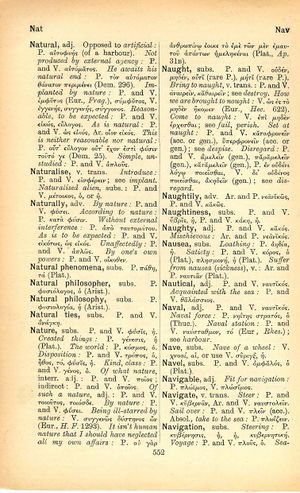nausea: Difference between revisions
Γυνὴ τὸ σύνολόν ἐστι δαπανηρὸν φύσει → Natura fecit sumptuosas feminas → Es ist die Frau durchaus kostspielig von Natur
m (Text replacement - "(|thumb)\n(\|link=)" to "$1$2") |
m (Woodhouse1 replacement) |
||
| Line 1: | Line 1: | ||
{{Woodhouse1 | {{Woodhouse1 | ||
|Text=[[File:woodhouse_552.jpg|thumb|link={{filepath:woodhouse_552.jpg}}]] | |Text=[[File:woodhouse_552.jpg|thumb|link={{filepath:woodhouse_552.jpg}}]] | ||
===substantive=== | |||
[[loathing]]: [[prose|P.]] [[ἀηδία]], ἡ. | |||
[[satiety]]: [[prose|P.]] and [[verse|V.]] [[κόρος]], ὁ ([[Plato]]), [[πλησμονή]], ἡ ([[Plato]]). | |||
[[suffer from nausea]] ([[sickness]]), v.: [[Aristophanes|Ar.]] and [[prose|P.]] [[ναυτιᾶν]] ([[Plato]]). | |||
}} | }} | ||
{{Lewis | {{Lewis | ||
Revision as of 08:57, 20 May 2020
English > Greek (Woodhouse)
substantive
satiety: P. and V. κόρος, ὁ (Plato), πλησμονή, ἡ (Plato).
suffer from nausea (sickness), v.: Ar. and P. ναυτιᾶν (Plato).
Latin > English (Lewis & Short)
nausĕa: or nausĭa, ae, f., = ναυσία,
I sea-sickness.
I Lit.: ne nauseae molestiam suscipias aeger, Cic. Fam. 16, 11, 1: navigavimus sine timore et nauseā, id. Att. 5, 13, 1: nauseā pressus, Cels. 1, 3.—
II Transf., in gen., sickness, nausea; vomiting (syn. fastidium): nausea segnis, quae bilem movet nec effundit, Sen. Ep. 53, 3: cruditates, quae nauseam faciunt, Plin. 26, 11, 69, § 112: elaeomeli non sine nauseā alvum solvit, id. 23, 4, 50, § 96: nauseam fluentem coërcere. Hor. Epod. 9, 35: ubi libido veniet nauseae, Cato, R. R. 156.—
B Trop., a qualm, nausea: cotidianam refice nauseam nummis. Audire gratis, Afer, ista non possum, Mart. 4, 37, 9.
Latin > French (Gaffiot 2016)
nausĕa¹² (qqf. -ĭa), æ, f. (ναυτία), mal de mer : Cic. Fam. 16, 11, 1 ; Att. 5, 13, 1 || nausée, envie de vomir : Sen. Ep. 53, 3 ; Plin. 26, 112 || [fig.] dégoût : Mart. 4, 37, 9.
Latin > German (Georges)
nausea (nausia), ae, f. (ναυσία), I) die Seekrankheit, ex nausea vomitus, Cels.: si sine vomitu nausea fuit, Cels.: navigamus sine timore et nausea, Cic.: qui navigavit et nauseā pressus est, Cels.: nausea enim me segnis haec et sine exitu, quae bilem movet nec effundit, torquebat, Sen.: nauseā edepol factum credo, Plaut. merc. 375 G.: Plur., nausias maris arcet, Plin. 27, 52. – u. übtr., übh. Übelkeit, Neigung zum Erbrechen, Brechreiz, dann auch = das Erbrechen, Kotzen, nausea et vomitio, Mart. Cap.: stomachi crebra nausea, quae cum vomitu saepe excitatur, utilis est, Marc. Emp.: ubi libido veniet nauseae, Cato: quod fluentem nauseam coërceat, Hor.: primum assumere (einnehmen) oportet quae nauseam faciunt (zus. = ein Brechmittel), Scrib. Larg.: alci nauseam movere, Fulg.: Plur., nausearum provocatio, Cael. Aur. de morb. acut. 3, 2, 7. – II) bildl., Ekel = Ekel erregende Langeweile, Mart. 4, 37, 9.
Latin > English
nausea nauseae N F :: nausea; seasickness

